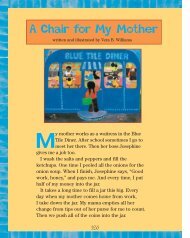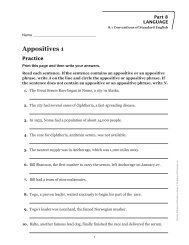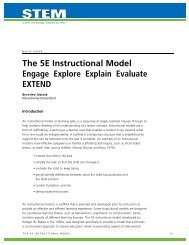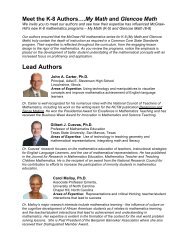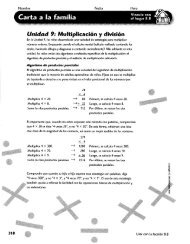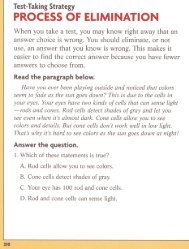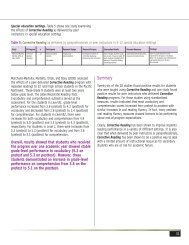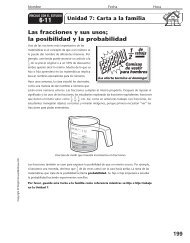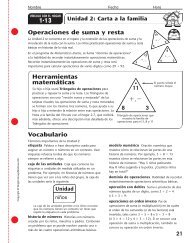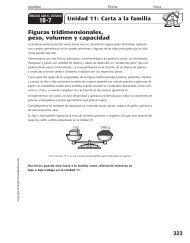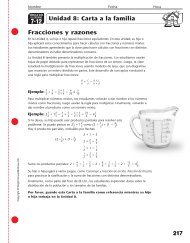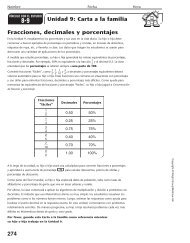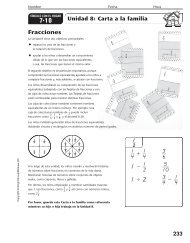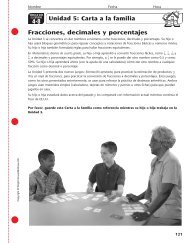Making Sentences - MHEonline.com
Making Sentences - MHEonline.com
Making Sentences - MHEonline.com
You also want an ePaper? Increase the reach of your titles
YUMPU automatically turns print PDFs into web optimized ePapers that Google loves.
Guided Instruction<br />
Using Conditional Clauses Use a<br />
conditional clause to finish a sentence.<br />
1. Select a set of photo cards to review.<br />
2. Show a card and model a sentence that<br />
includes the word on the card in a conditional<br />
clause. EXAMPLE Say: If I had an elephant,<br />
I would ride it to the park.<br />
3. Show another card to students and give the<br />
beginning of a conditional sentence. Have a<br />
student <strong>com</strong>plete the sentence aloud.<br />
EXAMPLE Show helicopter, and say: If I had<br />
a helicopter . . . Student might say: If I had<br />
a helicopter, I would fly to New York City.<br />
4. When students understand the activity, have<br />
them work with partners to create conditional<br />
sentences and practice them repeatedly.<br />
Build Vocabulary Vary the verbs in your<br />
conditional clauses. EXAMPLE If I had/saw/could<br />
ride in . . .<br />
Oral Language Practice<br />
Combining <strong>Sentences</strong> Work on noun-pronoun<br />
agreement when creating <strong>com</strong>pound sentences.<br />
1. Review several cards from any set of related<br />
photo cards.<br />
2. Ask a student the same question about two<br />
different cards. EXAMPLE Have you ever been<br />
in a police station? Have you ever been in a<br />
grocery store?<br />
3. Use the student’s answers to create one<br />
sentence about the two cards. EXAMPLE Nora<br />
has been in a grocery store, but she hasn’t been<br />
in a police station.<br />
4. Give two cards to each student. Have pairs<br />
interview one another and then <strong>com</strong>bine the<br />
two ideas into one sentence.<br />
Intermediate<br />
Level Activities<br />
SAMPLE ONLY<br />
©SRA/MCGRAW-HILL. ALL RIGHTS RESERVED.<br />
Independent Practice<br />
Using Signal Words Create longer sentences<br />
with signal words.<br />
1. Gather and review the following sight word<br />
cards: after, and, before, but, if, and so. Write<br />
the words or post the cards on the board.<br />
Assign each a number from 1 through 6.<br />
2. Organize small groups. Have one student in<br />
each group roll a number cube and create a<br />
sentence that includes the corresponding word.<br />
EXAMPLE Student rolls a 3 (before), and says:<br />
We study science before we eat lunch.<br />
Variation Challenge students to build on group<br />
members’ sentences to create a story.<br />
Independent Learning Strategies<br />
Self-Reliance Since learning extends beyond<br />
the walls of the school, encouraging students to<br />
discover things on their own will be a helpful tool.<br />
Introduce students to the class picture dictionary<br />
and thesaurus and any available online resources.<br />
Remind them that these resources are for students<br />
to use at any time, and encourage students to use<br />
them frequently.<br />
Sentence Frames<br />
Talk about Experiences<br />
She/He has , but she/he<br />
hasn’t .<br />
EXAMPLE<br />
• She has been to a movie, but she hasn’t been to<br />
a play.<br />
• He has visited Mexico, but he hasn’t visited<br />
Canada.<br />
Extend the Frame<br />
• She has been to a movie, but he hasn’t been to<br />
a movie.<br />
• I have tried yoga, but I haven’t tried dancing.<br />
6D SRA Vocabulary Picture Pack for English Language Learners—Primary<br />
Copyright © The McGraw-Hill Companies. All rights reserved.



